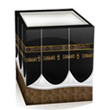Shortening the Thawb and Letting the Pants Drag
- Details
- Category: Sheikh Bin Baz
- Published on Thursday, 07 November 2013 10:48
- Hits: 962
Shortening the Thawb and Letting the Pants Drag
Question:
Some people wear their Thawb short above their ankles but allow their pants to remain long. What is the ruling on that?
Answer:
Isbal is unlawful, and it is wrong whether it is done with a shirt, Izar, pants, or a Busht. It applies to what hangs below the ankles, due to the saying of the Prophet (sallAllaahu `alayhi wa sallam):
ãÇ ÃÓÝá ãä ÇáßÚÈíä ãä ÇáÅÒÇÑ ÝÝí ÇáäÇÑ
"What is below the ankles from the Izar is in the Fire." (Al-Bukhari no. 5787)
He (sallAllaahu `alayhi wa sallam) also said:
ËáÇËÉ áÇ íßáãåã Çááå íæã ÇáÞíÇãÉ æáÇ íäÙÑ Åáíåã æáÇ íÒßíåã æáåã ÚÐÇÈ Ãáíã ÞÇá ÝÞÑÃåÇ ÑÓæá Çááå Õáì Çááå Úáíå æÓáã ËáÇË ãÑÇÑ ÞÇá ÃÈæ ÐÑ ÎÇÈæÇ æÎÓÑæÇ ãä åã íÇ ÑÓæá Çááå ÞÇá ÇáãÓÈá æÇáãäÇä æÇáãäÝÞ ÓáÚÊå ÈÇáÍáÝ ÇáßÇÐÈ
"There are three people that Allaah will not speak to on the Day of Judgement, will not look at them, will not purify them; and for them is a painful punishment: one who lets his Izar hang below his ankles, the Mannan with what he gives, and the Munffiq who does his business with false oaths." (Muslim no. 106)
And the Prophet (sallAllaahu `alayhi wa sallam) said to some of his Companions:
ÅíÇß æÅÓÈÇá ÇáÅÒÇÑ ÝÅäåÇ ãä ÇáãÎíáÉ
"Beware of Isbal! For indeed it is done out of conceit." (Abu Dawud no. 4084)
These Hadeeths proove that Isbal is one of the major sins, even if the one doing it claims that he does not mean to be conceited In it due to their generality and because they are unrestricted. As for the one who does it out of conceit, then the sin for him is greater and more severe because of the saying of the Prophet (sallAllaahu `alayhi wa sallam):
ãä ÌÑ ËæÈå ãä ÇáÎíáÇÁ áã íäÙÑ Çááå Åáíå íæã ÇáÞíÇãÉ
"Whoever drags his garment out of conceit, Allaah will not look at him on the Day of Judgement." (Al-Bukhari no. 5784 and Muslim no. 2085)
In this way there is unity between the case of Isbal and the case of pride, and we ask Allaah to help us against that.
As for when Abu Bakr As-Siddiq, may Allaah be pleased with him, said: "O Messenger of Allaah! "My Izar falls unless I take care (to hold it up)." The Prophet (sallAllaahu `alayhi wa sallam) said to him:
áÓÊ ããä íÕäÚå ÎíáÇÁ
"You are not one of those who do so out of conceit."
This Hadeeth does not prove that Isbal is allowed for someone who does not do it out of conceit. It only proves that when one's Izar, pants, etc., fall without doing it out of conceit, then he tries to stop that and fix it, in that case there is no sin on him. As for what some people do, wearing their pants below the ankles, this is not allowed. The Sunnah is that the shirt or anything else not to be lowered than the middle of the shin, in accordance with all of the Hadeeths. And with Allaah is the facilitation to do what is right.
Shaykh `Abdul-`Azeez Bin Baz
Fatawa Islamiyah, Vol. 7, Pages 375-377, DARUSSALAM





















